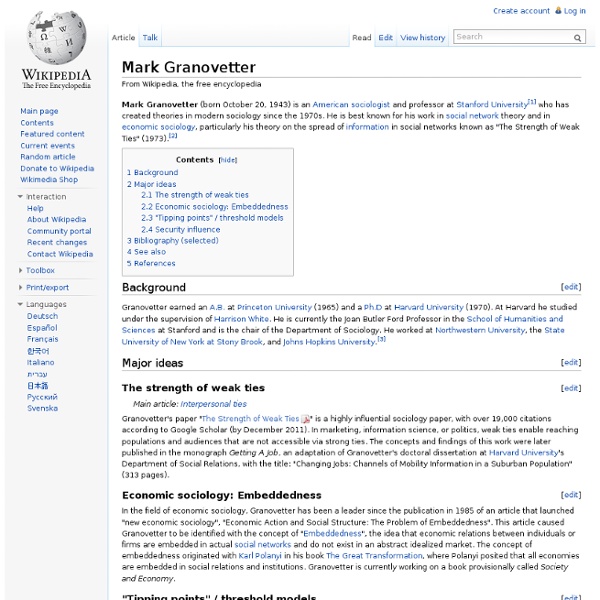Social capital
In sociology, social capital is the expected collective or economic benefits derived from the preferential treatment and cooperation between individuals and groups. Although different social sciences emphasize different aspects of social capital, they tend to share the core idea "that social networks have value". Just as a screwdriver (physical capital) or a university education (cultural capital or human capital) can increase productivity (both individual and collective), so do social contacts affect the productivity of individuals and groups.[1] Background[edit] The term "social capital" was in occasional use from about 1890, but only became widely used in the late 1990s.[1] In the first half of the 19th century, Alexis de Tocqueville had observations about American life that seemed to outline and define social capital. L. John Dewey actually used the term in his monograph entitled "School and Society" in 1900, but he offered no definition of it. Evaluating social capital[edit]
Interpersonal ties
In mathematical sociology, interpersonal ties are defined as information-carrying connections between people. Interpersonal ties, generally, come in three varieties: strong, weak, or absent. Weak social ties, it is argued, are responsible for the majority of the embeddedness and structure of social networks in society as well as the transmission of information through these networks. Specifically, more novel information flows to individuals through weak rather than strong ties. Because our close friends tend to move in the same circles that we do, the information they receive overlaps considerably with what we already know. Included in the definition of absent ties, according to Granovetter, are those relationships (or ties) without substantial significance, such as "nodding" relationships between people living on the same street, or the "tie", for example, to a frequent vendor one would buy from. History[edit] Research data[edit] In 1970 Dr. Social networks[edit] Recent views[edit]
Le Marché autrement. Essais de Mark Granovetter
Voici un ouvrage comme on en aimerait plus souvent : Le Marché autrement est un recueil des principaux articles en version française d'une figure marquante des sciences sociales, Mark Granovetter. Naturellement, le lecteur y retrouvera l'article sur la force des liens faibles (« The strength of weak ties ») paru en 1973. Pour mémoire, M. Granovetter y exposait les résultats d'une enquête effectuée auprès de cadres et de techniciens qui montrait que c'est par l'intermédiaire de « liens faibles » (anciens collègues, camarades de classe...) que ceux-ci avaient le plus souvent retrouvé un emploi et non, comme on pouvait le penser, en sollicitant des liens forts (amis, parents...). Publiés entre 1978 et 1990, les quatre autres articles permettent de mesurer l'apport de M. Sur la question de l'encastrement elle-même, M. Cerise sur le gâteau : les articles sont augmentés d'un texte écrit spécialement pour cette édition.
Embeddedness
In economics and economic sociology, embeddedness refers to the degree to which economic activity is constrained by non-economic institutions. The term was created by economic historian Karl Polanyi as part of his Substantivist approach. Polanyi argued that in non-market societies there are no pure economic institutions to which formal economic models can be applied. In these cases economic activities such as "provisioning" are "embedded" in non-economic kinship, religious and political institutions. In market societies, in contrast, economic activities have been rationalized, and economic action is "disembedded" from society and able to follow its own distinctive logic, captured in economic modeling. Karl Polanyi and Substantivist economics[edit] This difference in types of economy is explained by the 'embeddedness' of economic (i.e. provisioning) activities in other social institutions such as kinship in non-market economies. Mark Granovetter[edit] See also[edit] References[edit]
Fraunhofer-Gesellschaft
Un article de Wikipédia, l'encyclopédie libre. Fraunhofer-Institut Schmallenberg La Fraunhofer-Gesellschaft est un organisme allemand spécialisé dans la recherche en sciences appliquées. Son nom vient du physicien Joseph von Fraunhofer. Il regroupe 57 instituts répartis sur 40 sites à travers l'Allemagne, chacun spécialisé dans un domaine de recherche particulier et emploie 22 000 personnes en 2012[1] ce qui en fait l'un des principaux organismes de recherche au niveau international. Le nom officiel est Fraunhofer-Gesellschaft zur Förderung der angewandten Forschung e.V. Les instituts[modifier | modifier le code] Notes et références[modifier | modifier le code] Liens externes[modifier | modifier le code] Portail des sciences



